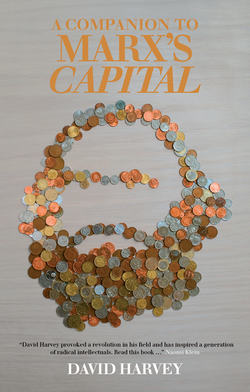A Companion to Marx's Capital

Реклама. ООО «ЛитРес», ИНН: 7719571260.
Оглавление
David Harvey. A Companion to Marx's Capital
A Companion to Marx’s. Capital
Contents
Preface
Introduction
CHAPTER ONE. Commodities and Exchange
CHAPTER TWO. Money
CHAPTER THREE. From Capital To Labor-Power
CHAPTER FOUR. The Labor Process And The Production Of Surplus-Value
CHAPTER FIVE. The Working Day
CHAPTER SIX. Relative Surplus-Value
CHAPTER SEVEN. What Technology Reveals
CHAPTER EIGHT. Machinery and Large-Scale Industry
CHAPTER NINE. From Absolute and Relative Surplus- Value to the Accumulation of Capital
CHAPTER TEN. Capitalist Accumulation
CHAPTER ELEVEN. The Secret of Primitive Accumulation
Reflections and Prognoses
A Note on the Texts Used
Introduction
CHAPTER ONE. The Circuits of Capital (Chapters 1–3 of Volume II)
CHAPTER TWO. The Three Figures of the Circuit and the Continuity of Capital Flow (Chapters 4–6 of Volume II)
CHAPTER THREE. The Question of Fixed Capital (Chapters 7–11 of Volume II)
CHAPTER FOUR. Merchants’ Capital (Chapters 16–20 of Volume III)
CHAPTER FIVE. Interest, Credit and Finance (Chapters 21–26 of Volume III)
CHAPTER SIX. Marx’s Views on the Credit System (Chapters 27–37 of Volume III)
CHAPTER SEVEN. The Role of Credit and the Banking System (Chapter 27 Onwards in Volume III)
CHAPTER EIGHT. The Time and Space of Capital (Chapters 12–14 of Volume II)
CHAPTER NINE. Circulation and Turnover Times (Chapters 15–17 of Volume II)
CHAPTER TEN. The Reproduction of Capital (Chapters 18–20 of Volume II)
CHAPTER ELEVEN. The Problem of Fixed Capital and Expanded Reproduction (Chapters 20 and 21 of Volume II)
CHAPTER TWELVE. Reflections
Notes
Index
Отрывок из книги
The Complete Edition
David Harvey
.....
Hence the mysteriousness of the equivalent form, which only impinges on the crude bourgeois vision of the political economist when it confronts him in its fully developed shape, that of money. He then seeks to explain away the mystical character of gold and silver by substituting for them less dazzling commodities, and, with ever-renewed satisfaction, reeling off a catalogue of all the inferior commodities which have played the role of the equivalent at one time or another. (149–50)
“The body of the commodity,” he goes on to say, “which serves as the equivalent, always figures as the embodiment of abstract human labour, and is always the product of some specific useful and concrete labour” (150). What does this say? Gold, for example, is a specific use-value, a specific commodity, produced under specific conditions of production, and yet we are using it as a means of expression of all human labor everywhere—we are taking a particular use-value and using it as a stand-in for all social labor. This raises complicated questions, as we will see when we get deeper into the theory of money in chapter 2.
.....